How An Arboretum Outreach Activity Changed Students’ Attitudes Towards Sustainable Development
Link to the JSE December 2020 General Issue Table of Contents
Guertin JSE December 2020 General Issue PDF
Abstract: In Fall 2017, Penn State Brandywine kicked off an initiative titled Sustainovation, emphasizing programming and community collaborations through sustainability and innovation. The campus identified Tyler Arboretum as a community partner to work with to assist in advancing their education and outreach goals. Students from across the campus came together at the beginning of the semester for an initial meeting to be introduced to the United Nations Sustainable Development Goals (SDGs), to meet the community partner and to hear about the semester project of adding sustainability education to the arboretum’s fall festival Pumpkin Days. In addition, a validated survey from Biasutti & Frate (2017) was given to the students to define their attitudes towards sustainable development before working with this partner and the project. The survey addresses four sustainability constructs of Environment, Economy, Society, and Education. At the end of the semester, the same survey was given to student participants in this Sustainovation project for Tyler Arboretum. Aggregate data show that there is a statistically significant difference in student attitudes at a minimum 90% confidence level (t-test) for eight of the twenty survey statements in the constructs of Environment, Economy, and Society.
Keywords: community, outreach, sustainability education, environment, society
How an Arboretum Outreach Activity Changed Students’ Attitudes Towards Sustainable Development
In Summer 2017, Penn State Brandywine received a mini-grant from PepsiCo through the Penn State University Sustainability Institute. The purpose of this grant was to assist the campus in fulfilling its land grant mission of serving the citizens of Pennsylvania by partnering with three different local organizations over a three-year period to develop or enhance their sustainability efforts. Tyler Arboretum is less than one mile away from the campus in Media, Pennsylvania, and was a natural partner for us to select.
Across 650 acres, Tyler Arboretum is a public garden and arboretum with a mission to preserve, develop and share their diverse horticultural, historic and natural site resources in order to stimulate stewardship and an understanding of the living world (About Tyler Arboretum). The Arboretum is active in providing educational programs through summer camp and school fieldtrips but struggles to include hands-on learning activities during their major festivals open to the public, such as their annual fall festival Pumpkin Days. Penn State Brandywine has frequently utilized the Arboretum as a site for student internships and independent research projects, and for campus class visits. Despite being located so close to each other since 1970, the two institutions did not have a formalized partnership.
Penn State Brandywine is one of 24 campuses of The Pennsylvania State University in the state of Pennsylvania. With an enrollment of approximately 1,200 students, half of the students will remain on campus all four years to complete a baccalaureate degree while half will transfer to another Penn State campus or local institution for their major. Located 20 miles west of Philadelphia, the campus is predominantly a commuter campus with students from southeastern Pennsylvania. Penn State Brandywine has a faculty Sustainability Committee but also formed a separate faculty/staff Sustainovation Team (“sustainovation” = sustainability + innovation) and student Sustainovation Club to carry out the work of the PepsiCo grant in the community. We purposely created a new name to separate ourselves and our work from the existing Sustainability Committee, to indicate that our efforts were pushing our community to think outside-the-box for solutions, and to combat the stereotype among students that “sustainability” is only about going green and planting trees.
In discussions with the Tyler Arboretum Executive Director, we learned that the Arboretum would welcome us as a partner. We were looking to plan fall and spring programs. Tyler’s Pumpkin Days event, held annually in October, with draws of 1,000+ visitors over a 2-day period chock full of fun, family-focused activities, seemed to offer the perfect opportunity to educate the community, adults and children alike, about sustainability. This outreach also needed the input of our Brandywine student volunteers to succeed, and we were curious if they would be interested in a one-time sustainability outreach event. We set about our on-campus promotion plan to introduce the idea to the students and to secure participation and generate ideas.
Project Development
The collaboration began by assisting Tyler Arboretum meet its need for the addition of educational programming during their two-day Pumpkin Days event in October 2017, requiring curricular and co-curricular involvement on the part of the campus for success. Our Sustainovation Team of three faculty and three staff wanted to ensure that the activity was created in collaboration with Penn State students and in consultation with the Tyler Arboretum Director of Public Programs, Amy Mawby, so we made Amy an outside member of the Team. Our goal for Pumpkin Days was to create an information station run by Penn State students to educate Tyler’s visitors on a sustainability issue impacting the planet, to share ways that visitors can change personal behaviors and/or encourage others to do so, and to have a related fun activity for kids and their families.
During the third week of the Fall 2017 semester, a luncheon was held on campus for all students that had an interest in joining sustainability-themed activities and/or who were in courses that had an embedded sustainability outreach component, including a Communications course that would be working on a separate-yet-related project to the information station for Pumpkin Days. More than 70 students attended the luncheon and were given a survey when they walked through the door to complete before the official lunch program began. The validated survey handed to students is one developed by Biasutti and Frate (2017) with 20 statements scored on a 5-point Likert scale that address attitude towards sustainable development along four constructs – Environment, Economy, Society, and Education (Appendix I). Identifying student information was not collected, but students were asked to indicate if they were enrolled in one of the courses or intended to participate in fall semester sustainability-focused activities on or off campus. The responses to the survey served to capture student attitudes before any introduction to sustainability or participation in any themed-activities overseen by the Sustainovation Team as part of the mini-grant.
Figure 1. Campus-wide student information session on the United Nations Sustainable Development Goals and the goal of a “sustainovation” project at Tyler Arboretum, held September 5, 2017, at Penn State Brandywine.
The luncheon included a short formal presentation addressing the United Nations Sustainable Development Goals and an overview of how our institution defines sustainability and connects our work to the SDGs.
Sustainability is the simultaneous pursuit of human health and happiness, environmental quality and economic well-being for current and future generations. (Penn State Sustainability Institute)
The final speech of the luncheon was provided by Tyler Arboretum’s Amy Mawby, who delivered an overview and history of the Pumpkin Days festival and how much the Arboretum valued the campus partnership to add an educational component to the event.
Project Design and Execution – Sustainovation Club
The student members of the Sustainovation Club decided to set up and name their onsite location at Tyler Arboretum a Sustainability Research Station. This name was intentional, as the students felt more visitors would be familiar with the term “sustainability” and might be drawn in by the word “research.” The Club then designed interactive activities for attendees laid out over multiple tables and a large grassy area. During the event, the student volunteers wore nametags that identified languages they spoke in addition to English to connect with and fully engage visitors more comfortable speaking other languages.
The first table asked visitors questions on their knowledge of single-use plastic straws and the impacts on the environment. The next table showed visitors alternatives to plastic straws (samples of straws made from stainless steel, titanium, bamboo, glass, or going strawless) and provided a flexible paper straw to take home to try out. Visitors were also provided a handout printed on recycled paper with information on these straw options and other sustainable products used at the Sustainability Research Station (Saying Yes/No To Straws brochure, 2017).
In the open, grassy area, kids and adults were challenged to design and fly a paper straw airplane, using different widths and thicknesses of construction paper and tape made from >75% recycled or plant-based material. The activity encouraged creative thinking, innovation, collaboration/competition with family members, and a fun way to explore engineering design.
Figure 2. The campus mascot, The Nittany Lion, spent some time at Tyler Arboretum during Pumpkin Days weekend to encourage and educate visitors to learn about the benefits of using paper straws.
Project Design and Execution – Communications Course
The course that also worked on a project to support the education and outreach mission of Tyler Arboretum was Penn State’s Introduction to Multimedia Production (COMM 270). This course requires students to be exposed to various types of media and to create content across a variety of digital platforms, including photography, storytelling, script writing, interviewing, appointment scheduling, editing and presenting. Required for communications majors but also open to other students, the creation of a documentary about Pumpkin Days was a natural, immersive experience that addressed the course requirements. Different than a traditional movie, a documentary not only allows for the element of storytelling, but since it is non-fiction, also offers many pedagogical opportunities.
At the start of the semester, students viewed and analyzed a myriad of documentaries created by previous classmates, or other more professional productions. Early lectures focused on “multimedia storytelling,” explaining form, editing, cinematography, pacing, and the concept of ethics. Students were provided formal training sessions using iMovie to emphasize best practices, editing and backup procedures.
There were many moving parts for the documentary project, requiring parameters such as deadlines be strictly defined and explained to students. Components of the audiovisual documentary project included goal treatment statements, followed by storyboard and script drafts (two at minimum), explanations of interview protocol, technical requirements, plagiarism and fair use of music, and presentations of rough and final versions of the film. Most of these were graded assignments as part of the greater documentary grade. Lab sessions provided additional technical practice focusing on taking still photos from various angles and distances; creating wordless short videos that tell a story; incorporating journalism by writing a summary promo for the film; and preparing for the interview.
A student team of five students in Introduction to Multimedia Production took on the assignment to create a documentary about Pumpkin Days. The students composed and edited the script; conducted interviews with both Amy at Tyler and co-author Guertin on campus; attended the Pumpkin Days event in order to secure appropriate video footage and still shots; and conducted additional on-site interviews with participants. They also obtained all the necessary photography permissions from those appearing in the film. Upon completion of the project, they continued to work with Penn State Brandywine’s University Relations office to further edit and close caption the piece so that it could be placed on YouTube channels.
Project Results and Student Attitude
We were pleased to work with Tyler Arboretum in developing an activity that was educational and engaging, allowing our students to share the impact of single-use plastic straws and provide some alternatives to help the environment. The Penn State Brandywine volunteers, averaging five volunteer hours per student over the weekend, interacted with over 800 Tyler visitors and facilitated the construction of over 350 paper straw airplanes. The students in the Communications course produced a documentary on the 2017 Tyler Arboretum Pumpkin Days celebration, which included the Sustainability Research Station:
If the video does not appear, it can be accessed by clicking on this link: https://www.youtube.com/watch?v=d5Al1-TBmmY.
Six weeks after Pumpkin Days weekend, students were asked to meet for a final end-of-the-semester celebration to view the eight-minute documentary and to complete the Biasutti and Frate (2017) attitude towards sustainable development survey once again. Students were not asked to provide any personal identifiers, as the resulting data and comparison to the pre-project survey data were done in aggregate. Only the survey forms marked by students that participated in Pumpkin Days or the creation of the documentary were included in the post-survey analysis.
Average scores for each of the 20 questions pre- and post-project were calculated and then run through a t-Test analysis with two-sample assuming unequal variables. A measured increase in attitude was determined statistically significant for each item with a minimum 90% confidence interval (CI). For the Environment construct, students show an improved attitude for three of the five questions. For the Economy construct, students had an increase in attitude in two of the five questions. For the Society construct, there was an increase in attitude for three of the five questions. For the Education construct, there was no measurable improvement in attitude. Table 1 presents the questions and data.
Discussion
There was not a baseline of sustainability knowledge determined for the students at the beginning of the semester. The students that contributed to Pumpkin Days came from across all four class years and different majors and we knew would have varied, previous exposure to sustainability topics. However, we did not seek in our survey to measure changing content knowledge. While it is possible new knowledge could change attitudes, this study only explored changing student attitudes towards sustainable development.
The Environment and Society constructs each saw improved attitude on three of the four statements presented on the survey. As the activity the students designed and carried out for Pumpkin Days specifically focused on the impacts of plastics on the environment and how individuals could change their behaviors, this did not surprise us as an outcome. That there was no measured improvement in attitude for any of the four statements within the Education construct could be viewed as unusual, especially since the students were educating the visitors as part of the Sustainability Research Station. We believe a lack of understanding of some of the terminology used in the statements they ranked may have led to confusion in how to respond, which could have impacted our measured attitudinal results. For example, the first statement in the Education construct reads, “Teachers in college should use student-centered teaching methods.” We are not convinced that students know what a student-centered teaching method is. Another statement reads, “Teachers in college should promote interdisciplinarity between subjects.” One student had circled the word “interdisciplinarity” on their survey form and wrote next to it, “I don’t know what this means.” Although we believe education is viewed as important to our students, especially as they volunteered their time on a weekend to help a community partner with an education activity, we were not able to statistically measure a change in attitude towards education.
Additional informal feedback was collected from the students that completed the documentary project. Despite some initial resistance to the project, most students enjoyed the experience and claim to have learned much more than they anticipated. In addition to creating a documentary that allowed Penn State Brandywine to assist a community partner in showcasing their education and outreach mission, the documentary can now be used by students for portfolio material to share with potential future employers.
The Sustainovation Club continued with creating a Sustainability Research Station at Tyler Arboretum’s Pumpkin Days festival in 2018 and 2019, with each year having a different theme and hands-on activities. The Club has even expanded their sustainability-themed programming at Tyler, hosting events such as a citizen science water monitoring day and multilingual storytime with nature-themed books that students co-read in English and additional languages. We are excited to see this continual connection and expanded educational outreach by students to assist Tyler’s public programs staff in the area of sustainability. The students in the club have also taken these activities they designed for Tyler and expanded their own outreach by repeating these same programs at campus events open to the public, such as our STEM Career Day and Martin Luther King Jr. Day of Service.
Importantly, Tyler Arboretum has learned from our programs and changed some of their practices and purchases. For example, after the 2017 Pumpkin Days festival, the Arboretum immediately switched to using paper straws and no longer has plastic stirrers at any of their events or in their offices.
The involvement of students in this community outreach initiative provided an excellent learning opportunity for them. Students not only developed knowledge on sustainable development but also enhanced their communication and leadership skills as well as their sense of responsibility to protect the environment and be good citizens. In summary, those involved in Pumpkin Days enjoyed the experience and learned the larger significance that sustainable practices can have on health and happiness for future generations. It also served as a jumping off point for future collaborations with Tyler Arboretum that continue today. Additionally, the Brandywine campus’ sustainability efforts collaborated to work to create more educational opportunities on campus while continuing collaborations in the community.
Acknowledgements
The authors credit the staff members of the Penn State Brandywine Sustainovation Team (A.J. Downey, Adrienne Showalter, Justin DiMatteo) for their collaboration and support. The authors wish to thank the Penn State Sustainability Institute for the awarding of a PepsiCo mini-grant to fund the Sustainability Research Station activities at Tyler Arboretum’s Pumpkin Days celebration in October 2017. A review of this project and student survey was conducted by the Office for Research Protections at The Pennsylvania State University and was determined to be exempt research, therefore not requiring IRB review (STUDY00007920).
References
About Tyler Arboretum (n.d.). Tyler Arboretum. Retrieved August 25, 2020, from https://tylerarboretum.org/history/
Biasutti, M. and Frate, S. (2017). A validity and reliability study of the attitudes toward sustainable development scale. Environmental Education Research, 23(2): 214-230. doi: 10.1080/13504622.2016.1146660
Penn State Sustainability Institute. (n.d.). The Sustainability Institute [Home page]. Retrieved August 25, 2020, from http://sustainability.psu.edu/sustainability-institute
Saying Yes/No To Straws brochure (2020). Penn State Brandywine Sustainovation Team. Retrieved August 25, 2020, from https://scholarsphere.psu.edu/concern/generic_works/3xs55m979h
Appendix I:
Attitudes Towards Sustainable Development Survey Instrument
This is the survey from Biasutti and Frate (2017, p. 229-230) given to Penn State Brandywine students pre- and post-participation in the Pumpkin Days celebration at Tyler Arboretum. Four dimensions of sustainable development are measured in these questions – environment (questions 1-5), economy (questions 6-10), society (questions 11-15), and education (questions 16-20).







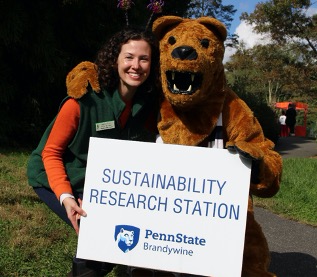
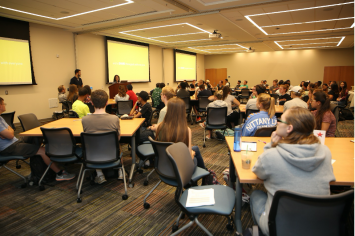
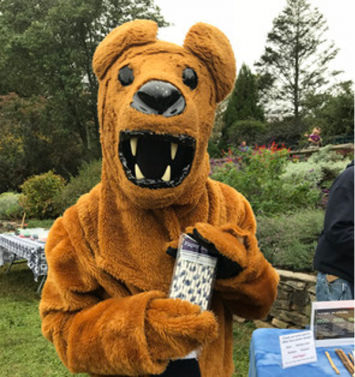
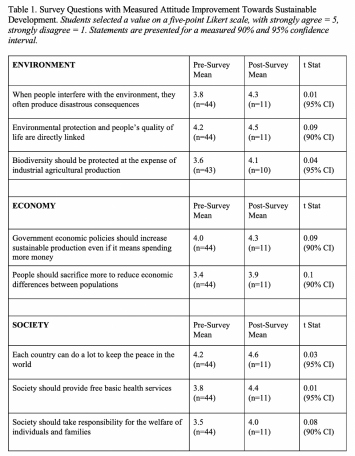
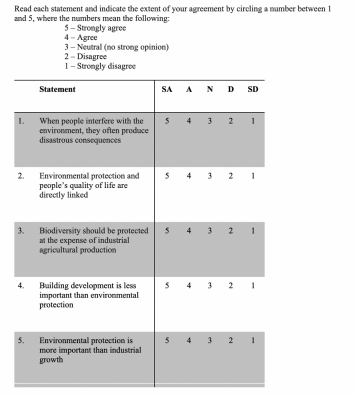
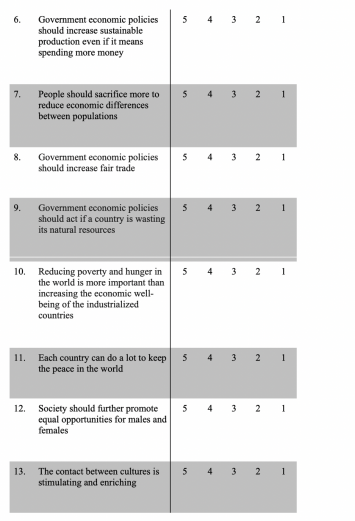
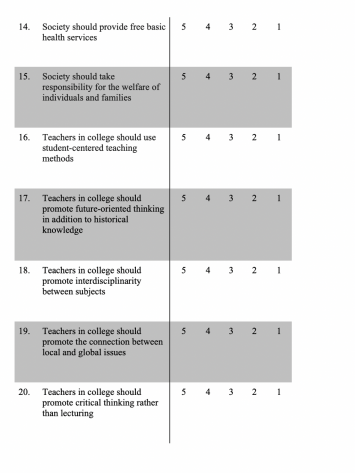



 Laura Guertin is a Professor of Earth Science at Penn State Brandywine. She has a BA in geology from Bucknell University and a Ph.D. in marine geology and geophysics from the University of Miami/RSMAS. She is a pedagogical researcher who explores how new and emerging technologies can enhance teaching and student learning in introductory-level courses in oceanography, energy, water, and climate change. Corresponding author: guertin@psu.edu
Laura Guertin is a Professor of Earth Science at Penn State Brandywine. She has a BA in geology from Bucknell University and a Ph.D. in marine geology and geophysics from the University of Miami/RSMAS. She is a pedagogical researcher who explores how new and emerging technologies can enhance teaching and student learning in introductory-level courses in oceanography, energy, water, and climate change. Corresponding author: guertin@psu.edu  Karen C. Theveny is an Assistant Teaching Professor of Communications at Penn State Brandywine where she teaches a variety of courses including: public relations, multimedia production, journalism, and advertising. She earned her BA in communications from West Chester State College and an MBA from Widener University. Her interests include social media’s impact on journalism and public relations. She is the co-author of a chapter in two books: “Innovations and Implications of Persuasive Narrative” and “Social, Mobile, and Emerging Media around the World: Communication Case Studies.”
Karen C. Theveny is an Assistant Teaching Professor of Communications at Penn State Brandywine where she teaches a variety of courses including: public relations, multimedia production, journalism, and advertising. She earned her BA in communications from West Chester State College and an MBA from Widener University. Her interests include social media’s impact on journalism and public relations. She is the co-author of a chapter in two books: “Innovations and Implications of Persuasive Narrative” and “Social, Mobile, and Emerging Media around the World: Communication Case Studies.”  Ivan Esparragoza is a Professor of Engineering at Penn State Brandywine. He has a BS in mechanical engineering from Universidad del Norte in Barranquilla, Colombia and a MSc and Ph.D. in mechanical engineering from the Florida International University. His research interest includes engineering education, professional skills in engineering and sustainable design.
Ivan Esparragoza is a Professor of Engineering at Penn State Brandywine. He has a BS in mechanical engineering from Universidad del Norte in Barranquilla, Colombia and a MSc and Ph.D. in mechanical engineering from the Florida International University. His research interest includes engineering education, professional skills in engineering and sustainable design. 
